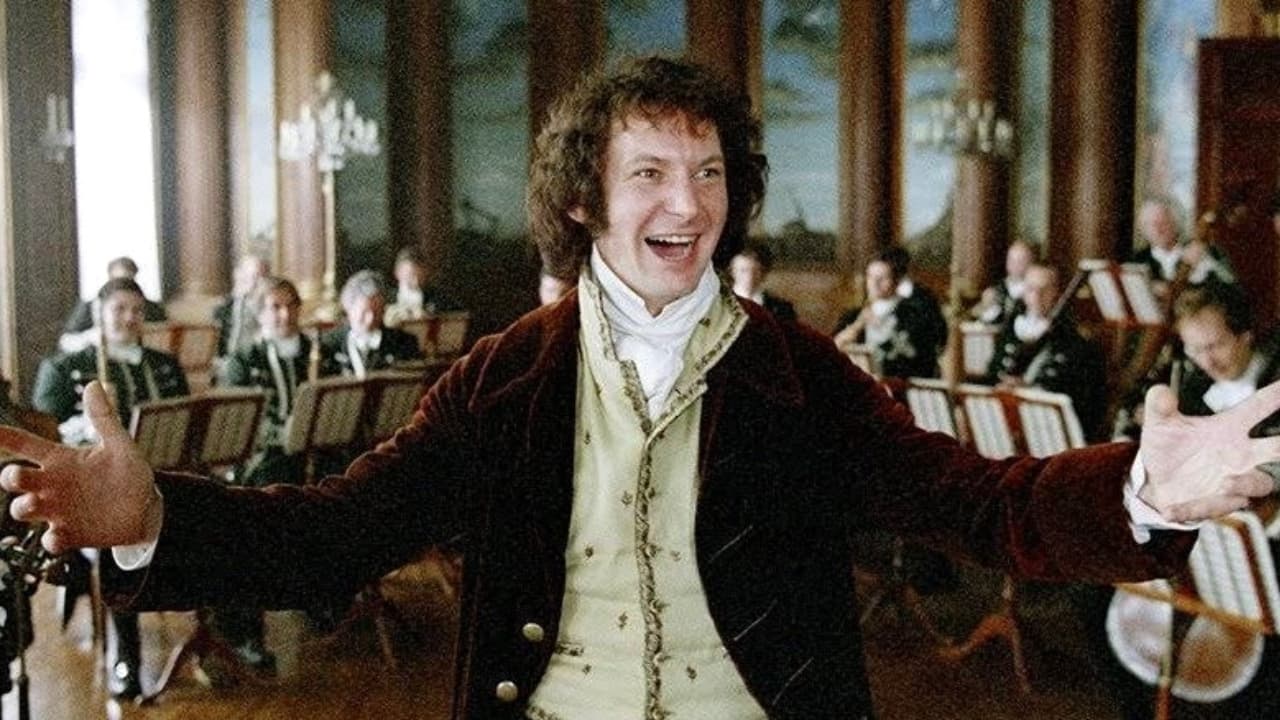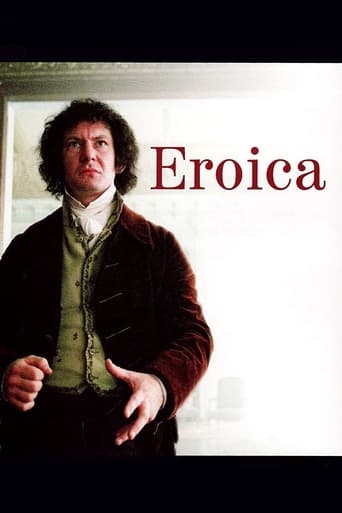

Strong and Moving!
... View MoreThis movie was so-so. It had it's moments, but wasn't the greatest.
... View MoreI think this is a new genre that they're all sort of working their way through it and haven't got all the kinks worked out yet but it's a genre that works for me.
... View MoreThis movie feels like it was made purely to piss off people who want good shows
... View More"Everything's different as of today" said a weary Josef Haydn, and how right he was."Eroica" is the best film about Beethoven that I have seen. OK, I've only seen three others, one of which was made in the 70s and I can't remember the name of that one. The other two were "Immortal Beloved" which was good, and "Copying Beethoven" which was horrendous. What attracted me to this movie was the clever direction and how it was made watchable despite the entire work being played throughout. When I say "despite", don't get me wrong, I'm a composer and I loved the music, but to be able to base an entire film around the complete performance (OK then, a rehearsal) of a particularly long work whilst simultaneously retaining visual and cinematic interest is a tricky task, and the director rose to the challenge magnificently. Ian Hart was convincing (unlike Ed Harris's comically over-acted portrayal, although his makeup was very good) and one of a very professional cast indeed. Isn't Fenella Woolgar gorgeous? Such a sexy nose! And so to the music. What was interesting was the fact that although Elliot Gardiner's soundtrack was obviously not that of which we see, it WAS played on period instruments. The biggest clue being when hearing the valveless horns playing the few notes that were not to be found within the harmonic series (on an Eb crook) sounding a bit flatulent. It also helps to know that John Elliot Gardiner is really hot on period instruments. I personally prefer modern orchestral instruments, but nothing can be taken away from the superb performance by this ensemble. Also the synchronisation must have been extremely tricky because all the musicians in shot were actually playing the music together, whilst acting simultaneously (they would have had to, to gurn their faces like they did as if the music was something completely new, which it so obviously was).But what really made the movie work was the silent reaction to the music of the surrounding gentry and servants. It really helped to bring tears to my eyes.A fabulous two hours of my time spent. Heartily recommended!!!
... View MoreFor some puzzling reason, I never really "got" the Eroica, but thanks to this marvellous production I (and hopefully many others) finally understand not only why the symphony was so important but also why it's so good! The basic idea of the film is that Prince Lobkowitz's orchestra is giving the first performance of the symphony for the prince and princess, the composer, and a few guests. After a shortish buildup to introduce the characters, the orchestra begins - and carries on for most of the film. As the music plays, we watch the characters listening, and occasionally hear their opinions. There is outrage when a trumpet comes in at the "wrong" time; smiles at certain musical turns of phrase; frowns at how loud it is. This superb film marries a great performance of a great work with an intelligent effort to put the whole thing in the context of its time. It isn't a film for people who already know all about the Eroica, but for a viewer who doesn't know Haydn from Howard Shore it must surely be enlightening.
... View MoreMany wonderful things mount up; Ian Hart gives a brilliant Beethoven, better even than Gary Oldman's in Immortal Beloved (although Tom Hulce's Mozart conducts more convincingly in Amadeus!). Fenella Woolgar gives a mature performance as the sympathetic Princess Lobkovitz in the same week as a brilliant big screen presence in Stephen Fry's Bright Young Things. The best scene of the film is the confrontation between Hart's Beethoven and his love Therese Lobowitz (the extraordinary Claire Skinner). She explains she cannot give up the security of a social title by giving herself over to his love; we hear the music drifting in from the upstairs hall, as if his own reaction of pain at this rejection sounding from his own misunderstood head.Notwithstanding Jack Davenport's excreable acting, this is where this film fails. The characters, from amused aristocrat, through knowing musician, to the Other Half slaving downstairs are required to put the power of the music into words. It cannot be done; in this context it undermines the integrity of the character and saps the power of the music by chaining it to a metaphor it already is. 'A Haydn would be finished by now!' is good - 'He's re-written the symphony as we know it' by the same footman is not.So many good ideas to give this essay flight extinguished by the need to explain an art that is it's own great and sole mouthpiece. 3/10
... View MoreNot so much film noir as film dusk, I spent the first ten minutes waiting for the set lights to be switched on. Having said that, Eroica is a beautiful to look at period piece about the first playing of Beethoven's Eroica or 'Napoleon' symphony (played by the wonderful Orchestre Revolutionaire et Romantique) for Prince Lobokowitz in Vienna. The film spans a day in the life of Beethoven in June 1804, examining not only his life and loves, but the lives of the musicians and the staff of the Palace in Vienna.Much of the 'action' revolves around the audience of this magical performance. If only the Director had resisted the temptation to spin round the viewers as they watched! The film certainly flew by, but I was left wishing that this was only the start of the film and not the totality.
... View More